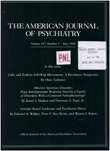The relationship of presenting complaints to the use of psychiatric services in a low-income group
Abstract
The presenting complaints of 503 subjects who contacted a mental health clinic serving an inner-city, low-income group were classified into mental state, physical functioning, social relations, and social performance. The authors examined the relationship between type of presenting complaint and race ethnicity, gender, age, marital status, DSM-III diagnosis, source of referral, and previous use of psychiatric services. Diagnostic group, source of referral, previous use of services, and type of presenting complaint were the four best predictors of number of outpatient visits. The increment in prediction produced by type of presenting complaint, however, was relatively modest.
Access content
To read the fulltext, please use one of the options below to sign in or purchase access.- Personal login
- Institutional Login
- Sign in via OpenAthens
- Register for access
-
Please login/register if you wish to pair your device and check access availability.
Not a subscriber?
PsychiatryOnline subscription options offer access to the DSM-5 library, books, journals, CME, and patient resources. This all-in-one virtual library provides psychiatrists and mental health professionals with key resources for diagnosis, treatment, research, and professional development.
Need more help? PsychiatryOnline Customer Service may be reached by emailing [email protected] or by calling 800-368-5777 (in the U.S.) or 703-907-7322 (outside the U.S.).



